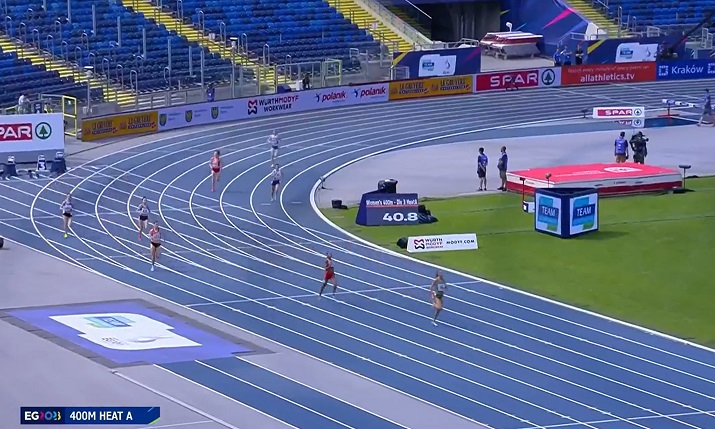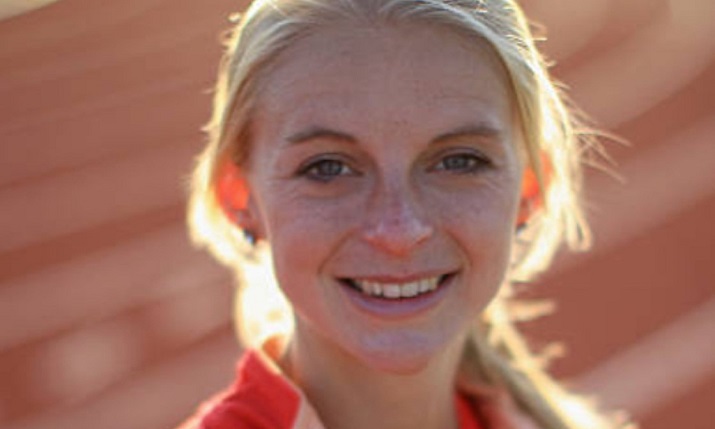Inside the EBU’s AI voice cloning project at the European Athletics Team Championships

A 400m qualification heat during the European Athletics Team Championships 2023
The European Broadcasting Union (EBU) is exploring the practical use of artificial intelligence (AI) in sports broadcasting with a voice cloning project during the European Athletics Team Championships in Poland, which begins today (Tuesday 20 June).
In between the live sessions of the Championships, AI-generated content will replace traditionally edited highlights with the cloned voice of former Team GB athlete-turned-commentator Hannah England. England’s voice will be used to turn a live blog into audio as part of a 24-hour live stream on the European Athletics website and YouTube Channel.
“This experiment represents the start of a fascinating journey which could free-up our commentators to focus on preparing for their next live session, while we deliver content on their behalf”
Eurovision Sport head of audio and innovation Christophe Pasquier told SVG Europe that Eurovision Sport had been inspired by EBU Swiss Romand member Couleur 3, the radio station operated by RTS Radio Télévision Suisse. In April, Coleur 3 used AI to generate a day’s worth of content, including the selection of a playlist, the voice cloning six of its DJs and their scripts.
“We listened to that, and we were impressed by the quality of it,” said Pasquier. “So we said, okay, let’s brainstorm and try to do something. And the idea was not to create a precedent as such – not to reinvent the wheel – but to optimise the existing resources and so we saw that the text-based blogs could be exploited in a different way. We considered text to speech, that became text to a cloned voice, which then became text to the clone of Hannah’s voice.

Hannah England: former World silver medallist and European Athletics commentator
“During the live sessions, fans will be able to listen to the real commentary created by a genuine human being, sharing the live emotion,” said Pasquier. “And then between the live sessions, the idea is to generate a loop, maybe 10, 15 or 20 minutes long, depending on the on the content, which will be made available between the live sessions and will be fully AI- generated content, including the blog-to-clone voice.”
When the cloned version is played out, listeners will be alerted to the fact it is a cloned voice, which is an important feature said Pasquier who also spoke of the ethical dimensions involved in the use of AI, all of which are arguably heightened by the public service remit of the EBU.
He said “AI and data are central themes for public service media today, and we are all aware of the potential abuses linked to the irresponsible use of AI. The EBU has for instance created an AI ethics group. Our organisations wish to test and demonstrate that these technologies can be effective tools if used in a strict and judiciously supervised framework.
“By developing AI strategies in close collaboration with our partners, we believe we can relieve the workload of our talents by delegating certain thankless tasks with low added value to algorithmic assistance.”
Fascinating journey
EBU radio senior sport producer Micky Curling has been tasked with combining the live commentaries of European Athletics experts with summaries generated by AI. He said: “Between live sessions of athletics, we have traditionally produced a mixture of highlights and reaction, a process that has been time consuming and labour intensive.
“As a producer, I now have the ability to generate fresh content without expecting my presenter to remain glued to her seat for hours after competition has finished. This experiment represents the start of a fascinating journey which could free-up our commentators to focus on preparing for their next live session, while we deliver content on their behalf. This requires a deep level of trust between the presenter and producer, that goes further than the existing relationship involving traditional editing and scripting.”
The EBU is working with AI start-up Respeecher to generate the clone of Hannah England’s voice, with Respeecher providing the voice cloning software for the initiative.
Respeecher synthetic speech artist Valerii Zablotskyi-Drohan said: “Considering it’s a 24-hour live audio stream, there is a lot of pressure and responsibility on the event host and organisers. We’re glad that Respeecher AI technology could help them save time and optimise resources, so they could focus on The Championships and distribute even more high-quality content for fans. The intersection of sport and AI is fascinating, so great to see European Athletics and the EBU encourage it, as there is a huge space for creativity”.
This project is part of Eurovision Sport’s efforts to explore how text-to-speech and voice-cloning technologies can allow European Athletics to exploit its content, data, and journalism across multiple platforms. Eurovision Sport, the sports division of the EBU, is the longstanding broadcast partner of European Athletics, and both organisations are also concerned by the notion of inclusiveness, said Pasquier.
European Athletics CEO Christian Milz added: “Athletics is arguably the most inclusive sport in the world, but we want to expand it further, making the sport available to everyone and customised to their needs – however they wish to engage with it.
“That’s why we’re constantly exploring how we can leverage advances in technology to achieve this and now, thanks to the wonders of AI and our partnership with Eurovision Sport, we have another innovative way to bring athletics to more people.”
The European Athletics Team Championships take place 20-25 June 2023 at the Slaski Stadium in Poland.

